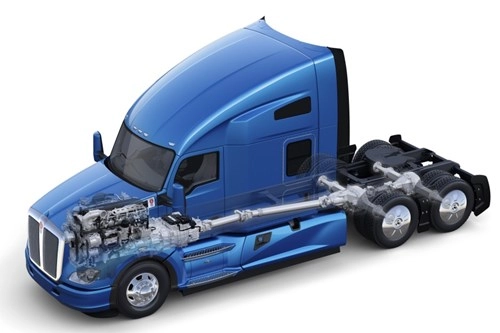Paccar Technical Center Expands to Drive Innovation in Trucking
August 16, 2024 - 8:21:03 am

The Paccar Technical Center (PTC) is expanding significantly, 42 years after its establishment in Mount Vernon, Wash. As of July 17, 2024, the facility employs over 600 people on its 450-acre campus, located approximately 90 minutes north of Paccar Inc.'s headquarters in Bellevue, Wash. According to PTC General Manager Phil Stephenson, the workforce is expected to grow by an additional 30 staff members in the near future. Paccar, the parent company, manufactures Kenworth and Peterbilt trucks.
The PTC is set to enhance its infrastructure with a new office building, adding 38,000 square feet of space for offices, meeting rooms, and a cafeteria. This expansion is projected to be completed by 2025. Historically, the PTC has served as a key site for product testing and validation within the Paccar organization. Engineers use the facility to simulate long-term road conditions through shake testing and chassis stress evaluations. Recently, the center introduced an innovation hub focused on new technologies, including 3D printing.
The PTC plays a crucial role in developing, testing, and validating alternative fuel trucks for Peterbilt, Kenworth, and DAF, a global Paccar brand. It also conducts compliance testing for California Air Resources Board (CARB)-certified engines. In June, Peterbilt announced the availability of CARB-compliant MX-13 diesel engines for its Model 579, 567, and 589 trucks, with Kenworth offering similar engines for its T680, T880, and W990 models.
The PTC's facilities include three laboratories dedicated to engine testing and calibration, encompassing a total of 213,000 square feet. The push for alternative fuel powertrains and vehicles has increased the demand for comprehensive testing, including simulations for cooling systems, battery performance, and the durability of battery-electric powertrains.
Peterbilt currently offers three battery-electric truck models: the 579 EV (regional haul day cab), the 520 EV (refuse truck), and the 220 EV (Class 6 or 7 truck). In May, Einride, a Stockholm-based autonomous electric vehicle company, announced an order for 150 579 EVs, marking the largest single order for Peterbilt’s electric trucks to date. Additionally, Peterbilt has partnered with Toyota to launch the 579 HFC, a Class 8 hydrogen fuel cell electric vehicle.
Kenworth has also collaborated with Toyota to develop an FCEV version of its T680 Class 8 truck, along with battery-electric options including the T680, K270E (Class 6), and K370E (Class 7) models. Starting in 2027, Paccar’s electric trucks will utilize battery cells produced in Mississippi through the Amplify Cell Technologies joint venture with Daimler Truck and Accelera, Cummins’ zero-emissions division. Stephenson, who has led the PTC for 12 years and has a background in battery technology from his previous roles at Exide Technologies and A123 Systems, has been involved in this battery technology development for about two and a half years.
With evolving truck technologies, the PTC is increasingly seeking new hires with interdisciplinary skills. Stephenson notes that the center is also expanding its focus to include software engineers for development and validation purposes. Key areas of interest include hardware-in-the-loop testing, which examines software integration with other truck systems, and the challenges of non-standardized fueling infrastructure. The PTC is actively testing how trucks interact with charging and hydrogen fueling systems.
Part of these efforts involves the SuperTruck 3 program, initiated by the Department of Energy in 2021 to advance zero-emission technologies for commercial trucks. Kenworth recently presented its SuperTruck 2 high-efficiency concept at the Advanced Clean Transportation Expo 2024, highlighting advancements in freight-hauling efficiency.
The SuperTruck 3 initiative reflects a broader industry shift towards sustainability and technological innovation in commercial transportation. As part of this program, the PTC is working on cutting-edge technologies to improve fuel efficiency, reduce emissions, and enhance the overall performance of freight-hauling vehicles. This program aims to drive the development of next-generation trucks that can meet increasingly stringent environmental regulations while delivering superior operational efficiency.
In summary, the Paccar Technical Center continues to play a pivotal role in the evolution of commercial trucks. Its ongoing expansions and innovations underscore the company’s commitment to advancing vehicle technology, particularly in the realms of alternative fuels and electric powertrains. With a growing team and an expanding array of facilities and capabilities, the PTC is well-positioned to address the future demands of the trucking industry and contribute to the advancement of sustainable transportation solutions.
As the trucking industry evolves, the PTC’s work in testing, validation, and innovation will remain crucial. The center's focus on integrating new technologies, from battery-electric and hydrogen fuel cell systems to advanced simulation and testing methodologies, will help shape the future of commercial vehicles. With these efforts, Paccar aims to maintain its leadership in the industry and support the transition towards more eco-friendly and efficient transportation solutions.

